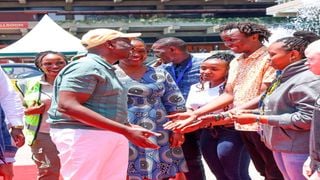
President William Ruto (left) and Environment Cabinet Secretary Soipan Tuya (partially hidden) meet delegates at the closing ceremony of the Youth Africa Climate Change Assembly at KICC in Nairobi on September 3, 2023.
| PCSClimate change: Involve us when making decisions, the youth say
The African youth want to be systematically embedded in climate frameworks, this was the key message from the Africa Youth Climate Assembly (AYCA) that concluded on Sunday (September 3).
AYCA is the official youth engagement mechanism of the Africa Climate Summit that begins today at the Kenyatta International Convention Centre (KICC).
At the closing ceremony, the youth secretariat, a representation of young people from different countries in Africa, presented the youth’s declarations to President William Ruto, the chair of the African Heads of State and Government on Climate Change.
“The process of drafting the youth declarations started early this year during the African Union town hall meetings. In the months leading to the summit, we held consultations with networks of young people from the five regional blocs. Our goal was to effectively capture the goals and the desires of the youth,” said Lumumba Kimanthi, who led production and communications of the assembly’s secretariat.
AYCA Lead Coordinator Elizabeth Wathuti explained that the climate crisis the world is facing today “prompted this response mechanism of unity and aligning among African youth”.
“For so long, young people have been at the periphery. We get invited to conferences and meetings but are excluded from the decision-making process. That is why we are not calling for inclusion of young people into these spaces but integration,” she remarked.
The declaration focused on six thematic areas: climate finance, adaptation, sustainable land use and blue economy, renewable energy resources, and tapping on natural capital.
The youth noted that Africa has the youngest population in the world and that they will be bequeathed climate change and the severity of its effects and subsequent generations.
“Besides pushing for African youth to be integrated in the issues of climate governance, we are also asking to be part of the green bank. During the UN biodiversity conference, one of the targets was 30 by 30, which aims to protect at least 30 per cent of both natural resources and blue economy resources. We want young people to be part of helping materialise that and be part of those disseminating and distributing renewable energy resources,” said Kimanthi.
The youth also expressed the need for capacity building of young people with disabilities, their inclusion, expertise, and access to resources in responding to climate events.
Anna Makau, a youth from Machakos described the youth declarations as a big win for young people.
“We are the people with solutions for the future but are often not listened to. The youth declarations represent a significant opportunity for young people in Africa to access funding, networks and like minded people and be part of climate action,” she offers.
In his speech, President Ruto acknowledged the need for young people to be in the province of decision makers and promised them a seat at the AU meetings.
“We are empowering our youth to ensure that they can articulate their issues and make sure that they are skilled. In Kenya, for instance, this year we doubled our budgets for TVETs (Technical and Vocational Education and Training institutions) and increased the budget for our universities to ensure that our young people are ready to tackle the challenges of the future. We are also investing and believing in young people. Not looking at them as part of the problems but part of the solution,” he says.
While referring to the Hustler Fund, President Ruto said the young people need access to credit that is offered with speed, can be upscaled and is affordable.
“We need to re-design and think of a new finance mechanism that not only funds our growth but does so with affordable interest. It must be with speed, upscaled and affordable,” he said.
Africa Development Bank President Akinwumi Adesina said that Africa needs to find resources to counter climate crisis.
“We have launched the Africa adaptation acceleration programme which is the largest in climate adaptation in the world to mobilise Sh36 billion ($25 billion) to support adaptation in Africa, build resilience infrastructure and support young people in the green economy. We also have a fund to provide 20 million farmers both livestock and crop insurance. Another 20 million farmers will also be supported to access climate resilience agricultural technologies,” he said.





